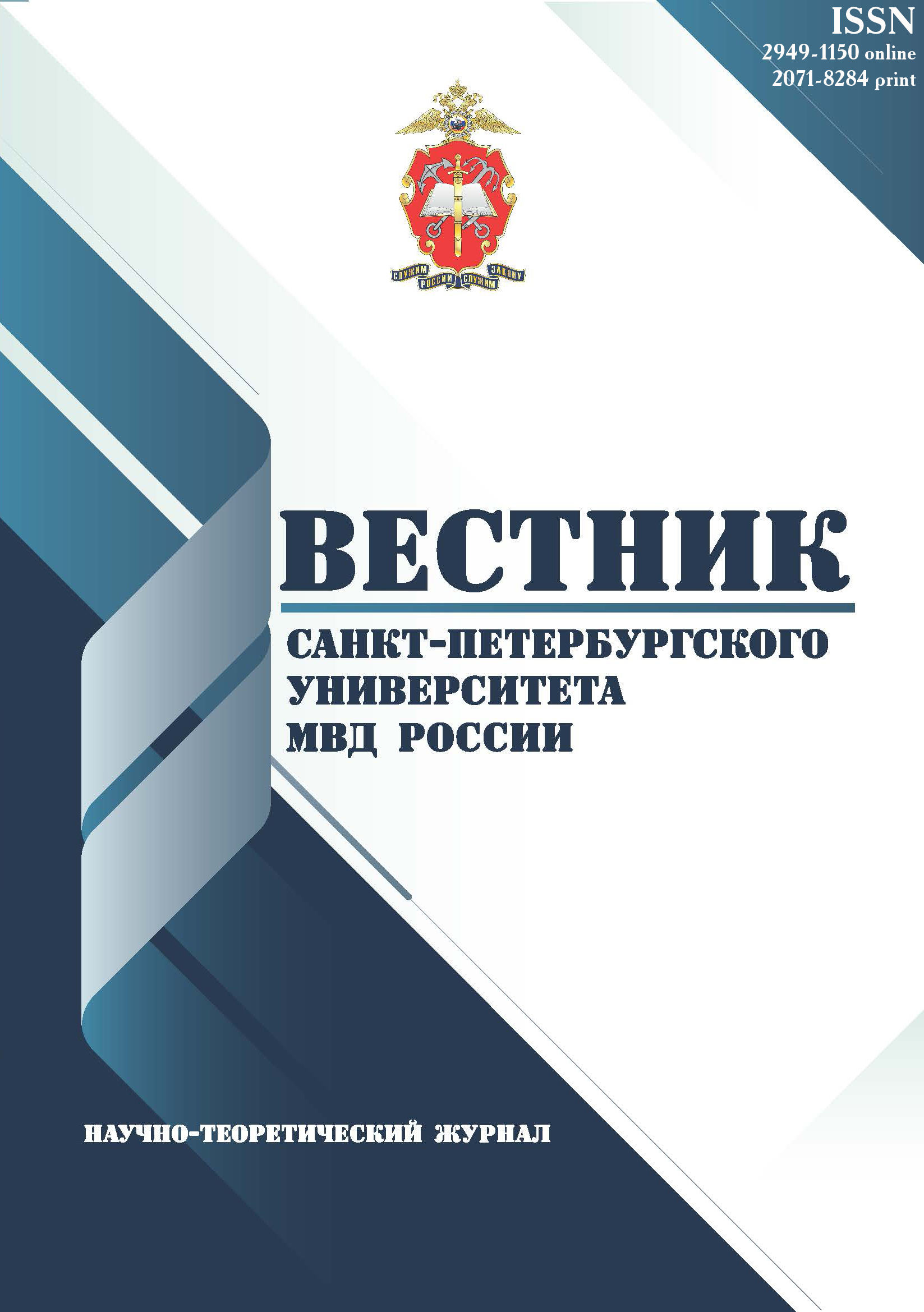UDC 343.2
Introduction. The main purpose of domestic criminal law and criminal legislation is known to be the protection of the most important and valuable rights and legitimate interests of individual members of society, various social groups, organisations and the state, peace and security of mankind. The effectiveness of this protection directly depends on the efficiency of the mechanism of criminal law counteraction to crimes with the Criminal Code of the Russian Federation being the central part of it. It is reasonable to recognise the dependence between the correspondence of the criminal law to the present-day realities of the life of society, whose reflection it should be by its very nature, and its potential for achieving the stated goals as accurately and as cost-effectively as possible. Taking into account that current reality is far from being static, but is continuously speeding up in its development, the dynamics of improving the normative legal document in question is beyond doubt. Methods. The research involved the method of system analysis. With the help of the method of dialectical development, the internal movement of particular parts of the mechanism (in our case of criminal-legal impact) in relation to the whole system was studied. Such general scientific methods as synthesis, induction, generalisation and abstraction formed the methodological core of the scientific work. The historical-legal method was useful in identifying the regularities of development and improvement of the Russian criminal legislation under different political, economic and social conditions. The formal-legal method was considered as a tool in analysing the norms of domestic criminal legislation and the signs of aggravating and mitigating criminal liability. The combination of logical and technical-legal methods made it possible to formulate the author’s proposals on improving the system and structure of the Criminal Code of the Russian Federation. Results. While carrying out the scientific research of the current state and tendencies in the development of domestic criminal legislation, the author revealed the interdependence between the simplicity and accessibility of understanding of legislative constructions of criminal-legal prohibitions by law-enforcers and their correct and effective implementation in investigative and judicial practice. In order to increase this accessibility, a set of proposals on improving the system and structure of the Criminal Code of the Russian Federation were formulated.
system, structure, effectiveness of law enforcement, aggravating circumstances, constructive signs
1. Konyahin V. P. Teoreticheskie osnovy postroeniya Obschey chasti rossiyskogo ugolovnogo prava : monografiya. Sankt-Peterburg : Yuridicheskiy centr Press, 2002. 348 s.
2. Pudovochkin Yu. E., Pirvagidov S. S. Ponyatie, principy i istochniki ugolovnogo prava: sravnitel'no-pravovoy analiz zakonodatel'stva Rossii i stran Sodruzhestva Nezavisimyh Gosudarstv : monografiya / pod red. S. S. Pirvagidova. Sankt-Peterburg : Yuridicheskiy centr Press, 2003. 295 s.
3. Ivanchin A. V. Real'nyy krug istochnikov ugolovnogo prava Rossii // Rossiyskiy sledovatel'. 2024. № 1. S. 27–30.
4. Bibik O. N. Istochniki ugolovnogo prava RF : monografiya. Sankt-Peterburg : Yuridicheskiy centr Press, 2006. 310 s.
5. Durmanov N. D. Sovetskiy ugolovnyy zakon : monografiya. Moskva : Izdatel'stvo Moskovskogo universiteta, 1967. 320 s.
6. Kozaev N. Sh. Ugolovnoe pravo v usloviyah nauchno-tehnicheskogo progressa : monografiya. Vladikavkaz : Olimp, 2013. 270 s.
7. Klenova T. V. 25-letie Ugolovnogo kodeksa Rossiyskoy Federacii : problemy kodifikacii // Yuridicheskiy vestnik Samarskogo universiteta. 2021. T. 7, № 4. S. 45–51.
8. Mal'cev V. V. Vvedenie v ugolovnoe pravo : monografiya / nauch. red. A. S. Sencov. Volgograd : Volgogradskiy yuridicheskiy institut MVD Rossii, 2000. 204 s.
9. Lopashenko N. A. O krizise rossiyskogo ugolovnogo prava (perechityvaya A.E. Zhalinskogo) // Gosudarstvo i pravo. 2023. № 9. S. 97–111.
10. Kraynova N. A. O tendenciyah sovremennoy ugolovnoy politiki v sfere protivodeystviya prestupnosti // Rossiyskiy sledovatel'. 2024. № 5. S. 34–38.
11. Schepel'kov V. F. Ugolovnyy zakon: preodolenie protivorechiy i nepolnoty : monografiya. Moskva : Yurlitin-form, 2003. 416 s.
12. Boyko A. I. Strukturalizm i stroenie UK RF 1996 goda // Rossiyskiy sledovatel'. 2024. № 1. S. 15–17.
13. Konyahin V. P., Aslanyan R. G. Pervichnye sistemno-strukturnye elementy rossiyskogo ugolovnogo prava // Rossiyskiy sledovatel'. 2024. № 1. S. 18–22.
14. Smirnov V. G. Funkcii sovetskogo ugolovnogo prava : (Predmet, zadachi i sposoby ugolovno-pravovogo regulirovaniya) : monografiya. Leningrad : Izdatel'stvo Leningradskogo universiteta, 1965. 188 s.
15. Ugolovnyy zakon : Opyt teoreticheskogo modelirovaniya : monografiya / otv. red. V. N. Kudryavcev, S. G. Kelina. Moskva : Nauka, 1987. 278 s.
16. Nepomnyaschaya T. V. Naznachenie ugolovnogo nakazaniya : Teoriya, praktika, perspektivy : monografiya. Sankt-Peterburg : Yuridicheskiy centr Press, 2006. 779 s.














